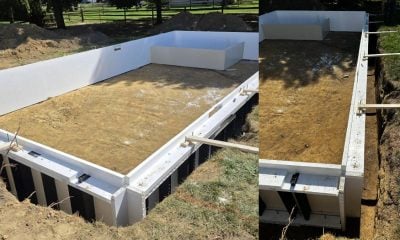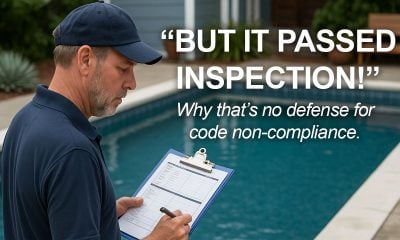Pool News
9/11 Memorial Pools – An In Depth Look at The Two Reflecting Pools
On the 20th anniversary of the September 11th attacks, we look at the two pools and Delta Fountains, the pool builders behind the 9/11 Memorial.

As the 20th anniversary of the attacks on September 11th approach, we take a moment to look at the 9/11 Memorial and the two reflecting pools that mark the footprint of where the Twin Towers once stood.
We are now looking back at a point in history that occurred before approximately 28.5% of Americans were ever even born. There are many memorials for the victims of 9/11, but none clearly encapsulate the raw emotions of absence the way the 9/11 Memorial does.
A look at the two reflecting pools at the 9/11 Memorial
Two reflecting pools mark the exact place of the World Trade Center and stand as a permanent place of remembrance. Both pools commemorate the names of nearly 3,000 killed in the attacks on September 11, 2001 and the World Trade Center bombing of February 26, 1993. Each of the victims names are inscribed on bronze parapets surrounding both of the memorial pools.

It’s hard to believe that two decades have gone by since the day happened that would forever change the course of our modern history. 9/11 is a moment in time that will live in as much infamy as December 7th (the attack on Pearl Habor), perhaps even more so in our generation. September 11th is important to people, and the memorial embodies what it means not only to New Yorkers who were first-hand witnesses, but to Americans who watched the events of September 11th unfold live on television.
The mourning and sorrow the nation still feels even twenty years later is evident in the amount of visitors the 9/11 Memorial draws each year. The memorial site was built to remember the victims as well as those involved in the rescue and recovery efforts.
Why did they choose reflecting pools for the memorial site?
Tracing their roots back to the ancient Persian gardens, reflecting pools have been a time honored traditional memorial structure and a water feature typically found in gardens and parks. One of the most iconic reflecting pools is at the Lincoln Memorial in Washington D.C. Most reflecting pools are shallow vessels and can range in size from as small as a bird bath to as large as a major civic center water feature like the one found at the 9/11 memorial site.
The 9/11 Memorial Design Competition
An open competition for designing the memorial site drew 5,201 entries from 63 countries. The thirteen-member jury chose eight finalists on November 19, 2003.
At a press conference held at Federal Hall National Memorial on January 14, 2004, the final design for the 9/11 memorial was revealed to the public. Israeli-American architect Michael Arad of Handel Architects and landscape architecture firm Peter Walker and Partners concept ‘Reflecting Absence‘ was chosen as the winning design. Their design consisted of a forest with two large, recessed pools that represent the Twin Towers’ footprints.

The deciduous trees (swamp white oaks) form informal clusters, clearings, and groves when arranged in rows. The park is located above the Memorial Museum, at street level. The names of the victims of the attacks (including those from the Pentagon, American Airlines Flight 77, United Airlines Flight 93, and the 1993 World Trade Center bombing) are inscribed on the parapets surrounding the waterfalls.
‘Reflecting Absence’ stands in the footprints of the Twin Towers
‘Reflecting Absence’ consists of two 1-acre pools. The structures are the largest man-made waterfalls in the United States. Both pools symbolize the loss of life and the physical void left by the attacks. The dual waterfalls are meant to drown out the sounds of the city, and create a peaceful haven of remembrance for what was lost.

Remembering those who were lost
On 152 bronze parapets on the memorial pools, the names of 2,983 victims are inscribed: 2,977 killed in the September 11 attacks and six killed in the 1993 World Trade Center bombing.

The two reflecting pools at the 9/11 Memorial
The North and South Fountains at the 9/11 Memorial have combined recirculating systems that pump up to 26,000 gallons of water per minute non-stop every day of the year. The water flows over the memorial’s two deep reflecting pools’ walls before being recirculated into catch basins.
The September 11 Memorial utilizes a method of keeping water constantly flowing from a 30-foot drop regardless of the weather New York City gets. The pool is engineered in such a way so that it’s reflective qualities and the sound of falling water remain consistent through the changing seasons.

The Builders of The 9/11 Memorial
You may not know this, but Delta Fountains are the pool builders responsible for building the 9/11 Memorial pools. Joe Petry, President of Delta Fountains said the company has done architectural and floating fountain designs for universities, police memorials, parks and more. They are also the firm behind the Oklahoma City memorial reflecting pool, built in honor of the lives lost on April 19, 1995 and the memorial at the Pentagon. Delta collaborated on the project with Siemens for the automation, pump and flow controls. Dan Euser of Waterarchitecture also worked on the project as well

Challenges in Engineering
There were more than a few challenging engineering feats Delta had to achieve in order to build the pools for the 9/11 memorial site. The weir structure they devised had specific requirements, one was the ability to easily adjust and level water flow to within 1/16th inch over 1400 linear feet.

Another challenge for Delta was avoiding dry spots. Engineers accomplished this thanks to integral-design adjustability which allows for constant expansion and contraction of adhesive materials while still maintaining structural integrity. They devised a method of adding ribs which helped to prevent buckling and allowed field welding.

How the reflecting pools are controlled and maintained
By far one of the most impressive aspects to these two reflective pools is the sophisticated smart chemical filtration system they use. The system is able to anticipate and react to New York’s inclimate weather conditions on the fly.
Chief Engineer – Anthony LoCasto, says it takes a crew of three men to clean the pools 5 nights a week and roughly 8 hours to clean, vaccuum and brush each of the memorial pools.
Both of the pools utilize a total of 16 pumps to circulate 26,000 gallons of water each minute. The system is responsible for circulating over 480,000 gallons of recycled water.
There is also a cutting-edge networked control management system which effectively monitors over a thousand different data points about the pools to maintenance personnel, making it one of the smartest pools on the planet.

The maintenance crews perform goes far beyond simply maintaining the pools; displaying a reverence for the victims with gestures of remembrance. One of their duties is placing a white rose on top of each victim’s name who has a birthday each day before the memorial opens to the general public.
The project, which also includes an underground museum that utilizes parts of the fallen towers, had a budget of $610 million and offically opened to the public on September 12, 2011; ten years and one day after the September 11th attacks.
Watch a time lapse of “How the 9/11 Memorial Was Built“. We hope you’ve enjoyed this article on learning what role folks in the pool industry had in creating the September 11 memorial. If you think it’s important to share the story, please do so. Feel free to make a donation to the 9/11 Memorial & Museum who are preserving the history of the events of September 11th for future generations to come.
Pool News
How a Backyard Pool Helped One Pool Salesman Lose 150 Pounds — and Completely Change His Life
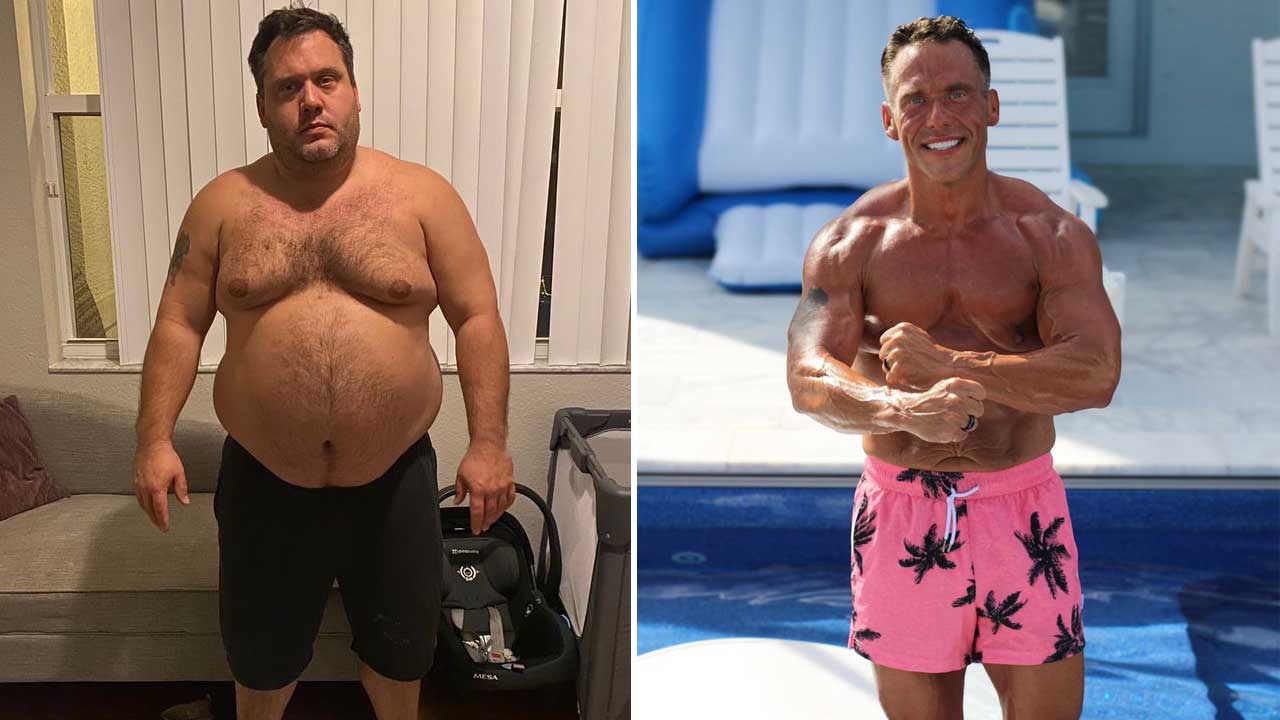
When James Votraw, Southeast Business Development Manager for Latham Pools, steps onto a jobsite or into a dealer’s office today, he carries a story that has now reached millions. Once weighing over 300 pounds and battling exhaustion, stress, and creeping health issues, Votraw has since become the face of one of the most inspiring transformations the pool industry has ever seen. Featured in Men’s Health, Men’s Fitness, and across national media, he lost nearly 150 pounds—not with fad diets, not with a punishing gym routine, but by stepping into the very thing that defines his industry: a backyard pool.
Before his transformation, Votraw was the picture of a hardworking industry veteran—managing more than 100 dealer accounts, traveling across Florida nonstop, and raising three children with his wife Jamie. “I’m in business development for Latham Pools and my main job is helping our dealers grow their businesses,” he explained. “Most of my days are part coaching, part problem-solving, and part road warrior.”
And while he always appreciated the joy pools brought to families, he never imagined the kind of personal transformation one could bring into his own life. “The funny thing is, I was helping everyone else build their dream lifestyle,” he said. “I wasn’t living mine. I was literally surrounded by pools, but not stepping into one.”
The shift began after a series of health scares—including weeks-long bouts of hiccups, a hospital visit, and dangerously high blood pressure—that forced him to confront the reality of where his health was heading. “I saw photos of myself and didn’t even recognize the person I’d become,” he said. “I was great at my job but terrible at taking care of myself.” With no medical solution in sight, he decided it was time to rebuild from the ground up.

Discovering the Power of a Pool
A Lifeline Just Ten Feet Away
What came next was as unexpected as it was life-changing. Votraw didn’t join a gym or hire a trainer. Instead, he made a connection that was hiding in plain sight. “I’ve been surrounded by pools my whole career,” he said. “I always knew they brought happiness to other people. But I never looked at one as a tool for transformation. One day it just clicked: I don’t need a gym membership. I have a world-class training tool sitting in my backyard.”
From that moment, everything changed. “Once I started swimming, the pool stopped being something I sold,” he said. “It became my therapy. My gym. My sanctuary.”
At 5:00 or 6:00 a.m., before his family woke up and before the dealer calls began, he slipped into the water and let the world fall away. Swimming became the space where he reset, recalibrated, and slowly reclaimed control of his health.
The Humbling Start
Even with a lifetime of recreational swimming behind him, the physical reality of swimming for exercise hit hard. “I thought I was just gonna glide across the pool like Michael Phelps,” he joked. “But those first few sessions were rough. Ten minutes felt like an hour. My lungs were on fire.”
But he kept showing up. Every day. No excuses. “I wasn’t chasing a six-pack. I was chasing consistency,” he said.
The First Major Shift
Around the one-month mark, everything began to click into place. “My body was changing, yes,” he recalled. “But the real shift was mental. I started craving that feeling of calm after a swim. That mental reset.”
Water forced him to be present. “Swimming forces you to breathe differently. You can’t check your phone. You can’t check your emails. It’s just you and your rhythm.”
His internal clock changed, too. “When I was heavy, I was forcing myself to get up at 7:00 a.m. Suddenly my body was waking me up at 5:00 a.m.—energized, ready.”

Rebuilding Life One Lap at a Time
A Routine That Became a Lifestyle
More than 500 consecutive swims later, Votraw no longer counts days. Swimming has become as ingrained as drinking his morning coffee. “Sometimes it’s 30 minutes. Sometimes it’s an hour. Sometimes I lose myself in the water and go way over,” he said.
There’s no playlist, no noise, no distraction. “It’s my alone time. It’s my quiet time,” he said. “It’s just me in my head.”
And he’s quick to emphasize that anyone can start small. “Don’t make it a mountain,” he said. “Ten minutes. That’s how I started. Ten minutes twice a day. Just get in the pool and be consistent.”
A Diet Built to Last
Unlike many weight-loss stories, Votraw didn’t rely on strict fad diets. “I wanted something I could do forever,” he said. “Nothing was off limits. I used an 80/20 approach. If I really wanted a McDonald’s cheeseburger, I’d work it into my calories.”
His philosophy is simple: sustainability beats intensity. “Everyone can lose weight,” he said. “The real challenge is keeping it off.”
By focusing on protein, fiber, whole foods—and yes, the occasional processed treat—he created a way of eating that supported his training without feeling restrictive. Today, in maintenance mode, he’s stronger, leaner, and more confident than he’s been in decades.
The Emotional Impact
Weight loss didn’t just improve his health; it changed how he saw himself. “It made me a better father, a better husband, a better employee,” he said. “I think I was good at all those things before… but this gave me confidence.”
One admission was particularly raw. “I used to hide behind black clothes,” he said. “Everything I wore was black. You don’t know your style when you’re hiding behind your weight.”
He also noticed a painful truth about society. “People treat you differently when you’re not obese,” he said. “People open doors. They talk to you differently. It does something for your confidence.”
What His Journey Means for the Pool Industry
A New Way to Talk About Pools
The pool industry is filled with messaging about fun, family, and lifestyle — but Votraw believes we’re underplaying one of the most powerful elements: wellness. “You don’t need a huge pool to make a huge impact,” he said. “Length for laps, consistent depth, integrated steps for recovery, automation, temperature control… that’s what matters.”
His own fiberglass pool is a testament to what a wellness-first design looks like. “I’m fortunate,” he said. “I have an auto cover, a heater and chiller, a freshwater system. It’s like swimming in a natural spring every day.”
Builders and designers, he believes, should rethink how they present pools during the sales process. “The narrative needs to shift,” he said. “The pool isn’t just a place to host barbecues or float with a beer. It’s a place to build better human beings.”
A Message the Industry Needs to Hear
People invest thousands in gym equipment, trainers, recovery tools, and fitness subscriptions. Meanwhile, the pool—often seen only as a luxury—is an all-in-one wellness platform hiding in plain sight. “The pool does it all,” Votraw said. “Cardio, strength, rehab, mindfulness.”
His transformation proves it.
And his message to the rest of the pool industry is simple: “What we build literally changes people’s lives.”
Ready to take a deeper dive?
Listen to our entire conversation with James Votraw on the Pool Magazine Podcast.
Lifestyle
The Summer Madison Square Garden Made a Splash
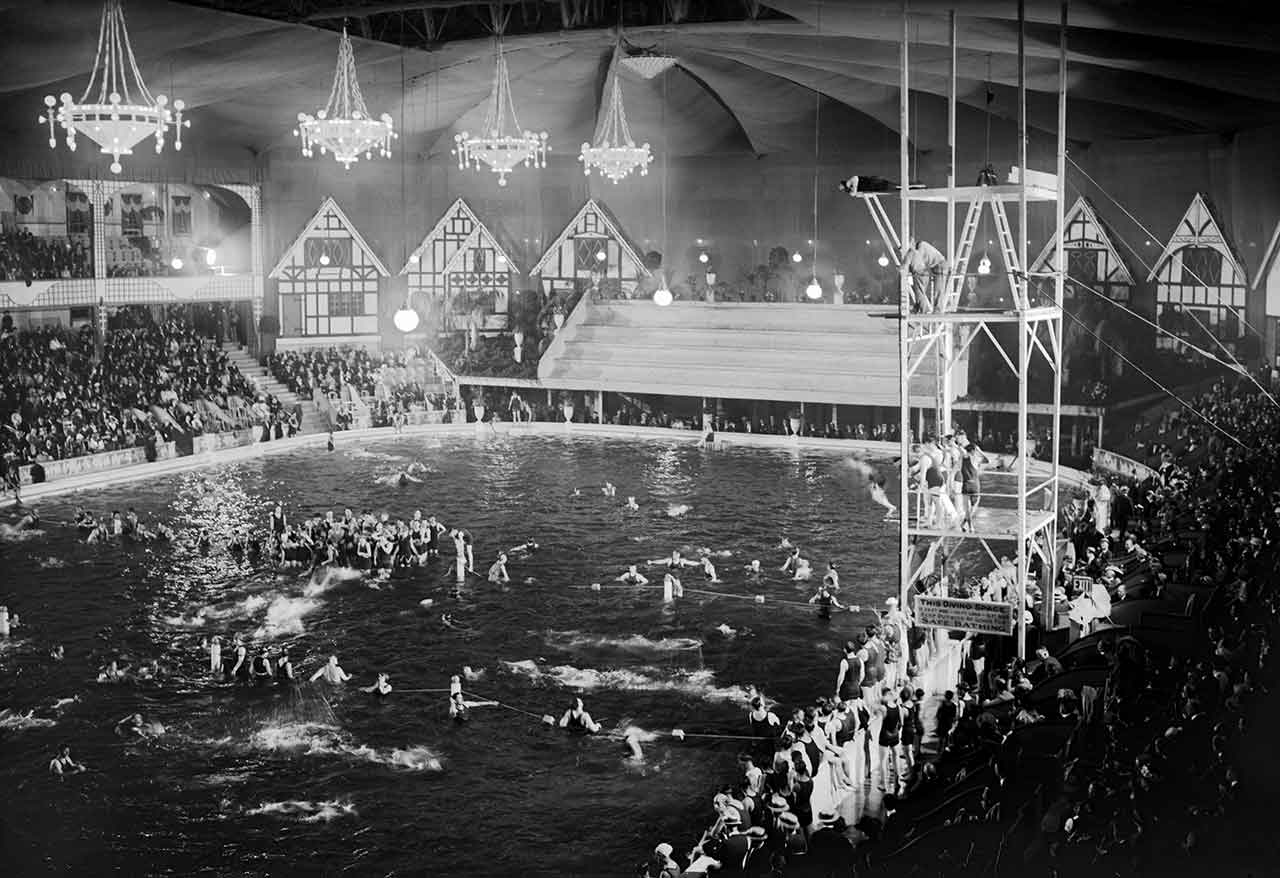
It’s hard to imagine Madison Square Garden—the hallowed stage for boxing legends, pop stars, and Knicks heroes—filled not with sweat and spotlights, but with thousands of gallons of cool, blue water.
Yet in the summer of 1921, that’s exactly what New Yorkers found: an enormous indoor swimming pool shimmering beneath the Garden’s vaulted roof, complete with a 25-foot waterfall, high divers, and room for 4,000 bathers.
The air was thick with humidity and laughter. The scent of chlorine replaced the usual cigar smoke. Where Jack Dempsey once threw punches, teenagers were now perfecting their cannonballs.
Yes, there really was a time when Madison Square Garden was less “Fight of the Century” and more “Cannonball of the Century.”
The Showman Who Dreamed in Spectacle
To understand how New York’s most famous arena became a swimming pool, you have to know the man who made it happen: George Lewis “Tex” Rickard.
Rickard was a gambler, promoter, and born showman—the sort of man who could sell out an arena for a fistfight, then decide it ought to double as a sparkling oasis. By 1921, he was already a household name for staging some of the biggest boxing matches in history. But when the punches stopped and summer’s heat rolled in, Rickard needed a new crowd-pleaser.
His solution? Turn the Garden into “the world’s largest indoor swimming pool.”
It wasn’t as crazy as it sounded. This was the roaring heart of 1920s New York, after all—an era when the city was always inventing something new, louder, or flashier than the last big thing. And Madison Square Garden, sitting proudly at Madison Avenue and 26th Street, was already a shape-shifting venue for everything from horse shows to bicycle races. Why not add synchronized swimmers to the list?
“Madison Square Garden & The World’s Largest Indoor Pool”

When the Garden reopened in June 1921, visitors stepped into something entirely new. The arena floor had been transformed into a glittering expanse of water—250 feet long by 110 feet wide, sloping gently from three to fifteen feet deep.
At one end stood a 25-foot artificial waterfall, its constant cascade serving both as scenery and a diving platform. Beneath the electric lights, the water shimmered like blue silk, reflecting the arches of the Garden’s ceiling in ripples.
Spectators filled the bleachers, as if attending a prizefight—except now the combatants were swimmers showing off graceful dives, playful races, and even musical performances on floating stages.
By day, the pool opened to the public. Families paid a modest admission to swim where champions once sparred. By night, it hosted exhibitions and “aqua carnivals,” featuring feats of endurance, choreographed dives, and vaudevillian humor.
Newspapers gushed about the novelty. The New York Times dubbed it “the most remarkable transformation of an arena yet attempted.” And for one shining season, it worked.
A Pool Fit for a Promoter
Rickard himself would stroll the deck in his trademark cowboy hat, beaming like a man who had just invented summer. He was, in a way, a precursor to Walt Disney—an impresario of experience, never content with the ordinary.
But like many of Rickard’s schemes, the pool was ambitious to the edge of absurdity. Maintaining such a vast indoor body of water proved a technical challenge. Pumps ran around the clock; condensation clouded the air; even the horses stabled nearby for shows were reportedly unsettled by the humidity.
Still, the spectacle drew crowds—at least for a while. Then, as summer waned, so did the novelty.
By early fall, the Garden drained the pool. Within months, Rickard’s empire began to crack under scandal. He was accused—later acquitted—of serious misconduct, and soon lost his lease on the Garden. The building itself was demolished just a few years later, in 1925.
In the grand ledger of New York history, the pool existed for only one season—a blink in time—but what a scintillating blink it was.
The Curtain Closes
Like the city itself, the Madison Square Garden pool lived fast, only to disappear without much ceremony. By the following summer, the arena floor was once again packed with athletes, performers, and fans.
Rickard moved on to build a new Madison Square Garden uptown, which would host Joe Louis, Frank Sinatra, and a thousand other unforgettable nights. But no one ever filled it with water again.
Today, that second incarnation of the Garden survives only in grainy photos and one famous image labeled “The World’s Largest Indoor Swimming Pool.” In it, you can just make out the waterfall at one end, a few daring divers mid-air, and hundreds of swimmers basking beneath the glow of electric light—a perfect portrait of Jazz Age optimism.
Legacy and Reflection
What makes the Madison Square Garden pool so enchanting isn’t just its scale—it’s its spirit. It was equal parts engineering marvel and summer daydream, born from a time when spectacle itself was an art form.
For one brief, glistening moment, the city that prided itself on always looking up—to skyscrapers, spotlights, and stardom—looked down instead, into a pool of pure invention.
Modern New Yorkers hurry past the current Garden on 7th Avenue, never guessing that its ancestor once overflowed with swimmers instead of sports fans. But the story lingers, a reminder that even the grandest institutions once dared to be playful.
Maybe that’s what we love most about rediscovering stories like this: they remind us that behind every monument to success, there’s often a streak of beautiful madness.
After all, who else but a man named Tex Rickard would look at the world’s most famous arena and say, “Let’s fill it with water”?
5 Fun Facts About Madison Square Garden’s Forgotten Pool
- The Big Splash — The pool covered roughly 27,000 square feet—large enough to fit nearly a dozen Olympic-sized lanes end-to-end.
- A Waterfall Indoors! — A 25-foot artificial cascade tumbled into the deep end, doubling as a diving platform and photo op.
- Open to Everyone — For a few cents, everyday New Yorkers could cool off where heavyweight champions once fought.
- One-Summer Wonder — The pool opened in June 1921 and was gone by fall, never to return.
- Splashy Legacy — Though short-lived, it inspired a brief trend of “arena aquatics” in cities like Chicago and Atlantic City during the 1920s.
“For one glorious summer, Madison Square Garden was less fight night, more cannonball contest.”
Echoes Beneath the City
If you listen closely when you pass Madison Square Garden today, you won’t hear the roar of a waterfall or the cheers of swimmers—but perhaps a faint echo of that summer long ago.
The city has changed. The Garden has moved. But the dream remains the same: take something ordinary, and make it extraordinary.
Tex Rickard’s pool may have vanished beneath layers of history, but its ripples linger—a reminder that even the most iconic places once dared to make a splash.
Pool News
One on One With 2025 Million Dollar Pool Design Challenge Winner, Kirk Bianchi

This year’s Million Dollar Pool Design Challenge at the PSP/Deck Expo in Las Vegas delivered one of the strongest fields the competition has seen to date. Drawing a full house, the event brought together five talented finalists tasked with interpreting a complex, emotionally rich design scenario set in the hills of Napa Valley.
The homeowners in this year’s fictional brief—Lyle and Katherine Jackson—represent a compelling duality. Lyle gravitates toward Rocky Mountain rustic architecture and envisioned a wellness-driven retreat rooted in fire, stone, and rugged materials. Katherine, on the other hand, favors Palm Springs Mid-Century Modern and yearns for quiet spaces for meditation, intimate outdoor cooking, and a tranquil atmosphere that blends softly into the natural terrain.

With the couple having recently acquired an adjacent property, designers were challenged to unite these contrasting design languages while planning a full retreat that included private and public zones, rental-ready guest structures, and an amenity-rich outdoor environment. The brief required a spool and cold plunge off the master suite, a recreational pool, an oversized spa, a swim-up bar, outdoor dining for twelve, multiple covered structures, a koi pond, bocce ball, a yoga space, and incorporating features by Ledge and Fire by Design. All of it needed to feel authentic to Napa—its rolling grasslands, its live oaks, and its serene rural setting.

The judging panel reflected the gravity of the challenge. Returning winners Brad Holley and Moses Campos were joined by renowned designer Danny Wang, industry-leading photographer Jimi Smith, and PSN & Aquatics International Deputy Editor Rebecca Robledo. After the judges offered their commentary, the audience cast the final vote—turning this already technical competition into a true showdown of vision, execution, and storytelling.

When the dust settled, it was veteran designer Kirk Bianchi whose concept resonated most powerfully with both judges and audience, earning him the top honor in this year’s Million Dollar Pool Design Challenge. Judges responded to the clarity of intent and the cohesiveness of the layout. Audience members gravitated toward his handling of divergent aesthetics—a challenge many designers struggle with.
Kirk Bianchi’s Winning Design Entry in 2025’s Million Dollar Pool Design Challenge
From the moment Bianchi reviewed the scenario, he saw a rare opportunity: a pristine Napa hillside, unobstructed views in every direction, and a modernist home with a clear architectural voice inspired by Mies van der Rohe’s Farnsworth House. “It had a really clear language to the house,” he explained. “A glass box levitating off the land… it already had a beautiful language, and the setting was magnificent.”

Rather than approaching the brief as a checklist of amenities, Bianchi responded to it as a composer. His entire design philosophy—taught to him by his mentor decades earlier—revolves around thematic consistency. As he put it, “Everything has to have a motif. Architecture calls it a parti. You must have an overarching theme, and then it runs through your entire program like writing a piece of music.”

This became his guiding principle for blending the homeowners’ divergent aesthetic tastes. The home itself set the “melody,” and Bianchi refused to dilute it. Instead, he found opportunities for Lyle’s rustic sensibilities in the landforms: terraced retaining walls using Napa’s native basalt, log-inspired seating, and natural stone that grounded the modernist structures. “We’re going to speak to his language in the retaining walls and how we terrace the land,” he said, while allowing all elevated architecture—the guest houses, yoga pavilion, and pool pavilion—to float lightly above the stone just as the main residence does.
This decision unified the built environment while allowing the landscape to carry the rugged notes Lyle wanted. It was an elegant solution to one of the scenario’s biggest challenges.
How the Setting Shaped the Design
From the outset, Bianchi worked from the outside in—placing architecture, trees, and view corridors before drawing a single pool edge. The existing landscape featured mature live oaks and sweeping grassland valleys, and he refused to interrupt those natural compositions. “I like to focus on landscape architecture and place trees early,” he noted. “They were framing views of peaks and corridors in the distance… everything had to nestle into what was there and not look manufactured.”

This approach created a design that feels inevitable, as if the property itself whispered where structures should go. The pool pavilion, for example, landed along the western edge because placing it elsewhere would have blocked views from the office and living room. This, in turn, dictated the orientation of the pool and swim-up bar. “All of those lines were projected out into the lot,” he said. “There’s this magical framework you don’t see, but you perceive.”
Those alignments are central to Bianchi’s design identity. “You feel like you’re walking through a poem,” he said. “Lines travel the length of the property… you don’t know it until you stand there, and then the alignments reveal themselves.”
Creating Emotional Impact Through Sequencing
One of the most striking elements of Bianchi’s concept is how he orchestrated the experience of moving through the property. Drawing from art history and photography, he designs every space with foreground, middle ground, and background acting in harmony. “The impact of any space is how those three layers align,” he said. “When they do, it’s riveting.”
From the front entry, a reflective water surface becomes the first emotional cue—a shallow, oversized flooded deck that frames a circular spa carved within it. Bianchi intentionally split the spa into two entities: the heated seating zone and an expansive unheated mirror deck that extends the water’s visual weight without creating impractical heating demands. “Who said the inside of a spa has to match the outside?” he said. “You can use a very shallow body of water to make a reflective plane.”
This approach gave the design a cinematic quality, drawing visitors through the home and straight to a dramatic water tableau that anchors the landscape.

The Thoughtful Use of Fire
Fire played a significant role in the scenario, but Bianchi treated it with the same restraint he brings to all sensory elements. “It’s easy to overdo it,” he explained. “Think of it as salt—you want just enough.”
Instead of scattering decorative fire bowls throughout the yard, he integrated fire only where it supported human interaction: a polished, floating linear fire element subtly revealed between the spa and a stone wall; a sculptural double-sided fireplace anchoring the outdoor kitchen pavilion; an elliptical fire bowl at the yoga pavilion for meditative ambience; and a long rectangular fire pit flanked by refined log-inspired seating to bring people together.
“All of the fire lived where people would be,” he said. “Not as distractions, but as companions to the activities happening around them.”

Balancing Private Retreat and Airbnb-Ready Function
One of the brief’s major challenges was creating spaces that support quiet personal retreat while functioning seamlessly for small event gatherings and luxury rentals. Bianchi responded with transitional sequencing that draws from a formative architecture project in his college years.
He created privacy through orientation, topography, and carefully placed screens rather than fencing or bulky structures. The master suite, just eight inches from the public zone, gained privacy through landscape elevation changes and a custom louvered gate designed to disappear visually when viewed head-on but block oblique sightlines.
Guest structures, located along the far perimeter, each received a private micro-garden—a nod to Japanese courtyard design, where miniature landscapes deliver immense psychological separation even on tight footprints.
Bianchi credits transitions as the secret ingredient: “You need these transitional moments. They change your emotional state, just like a commute decompresses you before you walk into your home.”

Finalist Entries in This Year’s Design Competition
While Bianchi took home the win, this year’s competition showcased exceptional work across the board. Each of the finalists brought a distinct perspective to the Napa scenario, delivering interpretations that spanned a broad spectrum of styles, priorities, and creative problem-solving. It was fascinating to see how differently each designer approached the same topography, the same architectural language, and the same programmatic demands. The diversity of ideas on display underscored the strength and versatility of today’s design community.

Looking Toward Next Year: Bianchi Joins the Judging Panel
With this year’s victory, Bianchi will return to the Million Dollar Pool Design Challenge next year — this time as a judge. His perspective, grounded in decades of disciplined design thinking, will add an invaluable dimension to the panel. As he explained, what he’ll be looking for aligns with the same principles that guided his winning entry: thematic consistency, architectural alignment, and thoughtful reconciliation of divergent ideas. “You must have a theme. You must have a concept… It’s the belt that ties everything together,” he said. Next year’s competitors can expect him to look for designs that demonstrate a clear conceptual through-line rather than a simple accumulation of features.
Bianchi is also launching a new mentorship program through his website KirkBianchi.com, offering designers the kind of guidance he received early in his own career. His goal is to help elevate the industry by cultivating stronger design literacy and giving professionals access to structured critique, case studies, and conceptual development frameworks. The program will function much like a design studio, where participants can bring work, receive critique, and refine their process. “Let’s shave a decade or two off your learning curve,” he said, emphasizing his desire to help designers achieve clarity and coherence in their work.
As the design community looks ahead to next year’s Challenge, Bianchi’s transition from competitor to mentor and judge sets an exciting tone. His emphasis on theme, alignment, and emotional choreography will undoubtedly shape the standard for the next generation of entries — and raise the bar for the competition as a whole.
Ready to take a deeper dive?
Listen to our entire conversation with Kirk Bianchi on the Pool Magazine Podcast.
Photo Credits: Informa Markets
-
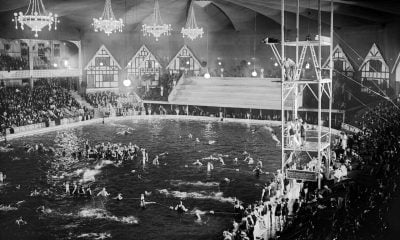
 Lifestyle4 weeks ago
Lifestyle4 weeks agoThe Summer Madison Square Garden Made a Splash
-

 Pool News4 weeks ago
Pool News4 weeks agoHow a Backyard Pool Helped One Pool Salesman Lose 150 Pounds — and Completely Change His Life
-
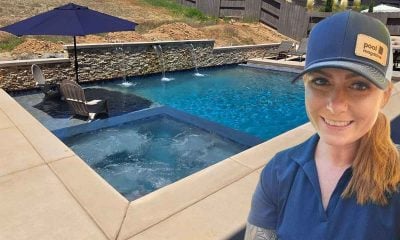
 Pool Builder4 weeks ago
Pool Builder4 weeks agoBecoming a Pool Builder: The Whirlwind of My First Pool Build
-
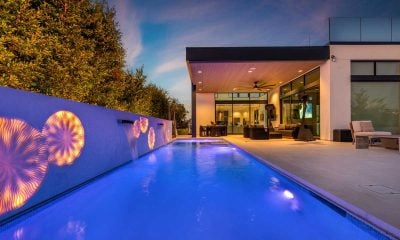
 Pool Builder4 weeks ago
Pool Builder4 weeks agoBuilding a Legacy: The Enduring Story of Mission Pools
-

 Pool Equipment4 weeks ago
Pool Equipment4 weeks agoThe Competitive Advantage, Automate to Dominate With Pentair Pool
-

 Press Releases3 weeks ago
Press Releases3 weeks agoPool Corporation Hosts 2026 Retail Summit, Showcasing Industry Innovations
-

 Pool Maintenance4 weeks ago
Pool Maintenance4 weeks agoThe Hidden Liability of a Green Pool
-
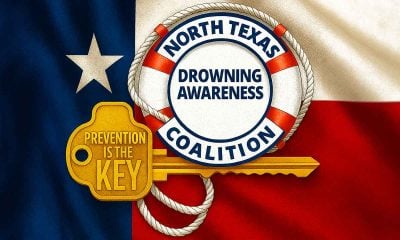
 Press Releases3 weeks ago
Press Releases3 weeks agoIPSSA Dallas Chapter Launches Non-Profit to Fund Swim Scholarships and Support Families Impacted by Drowning












